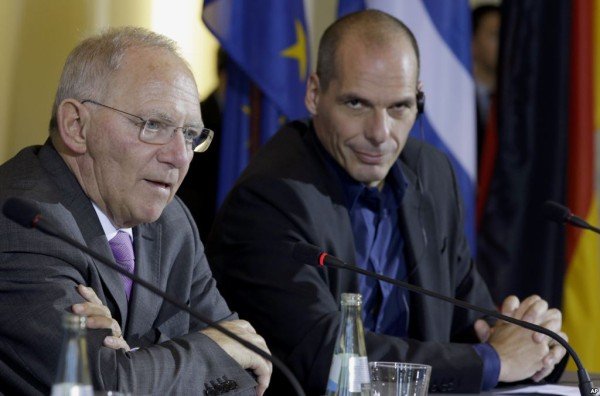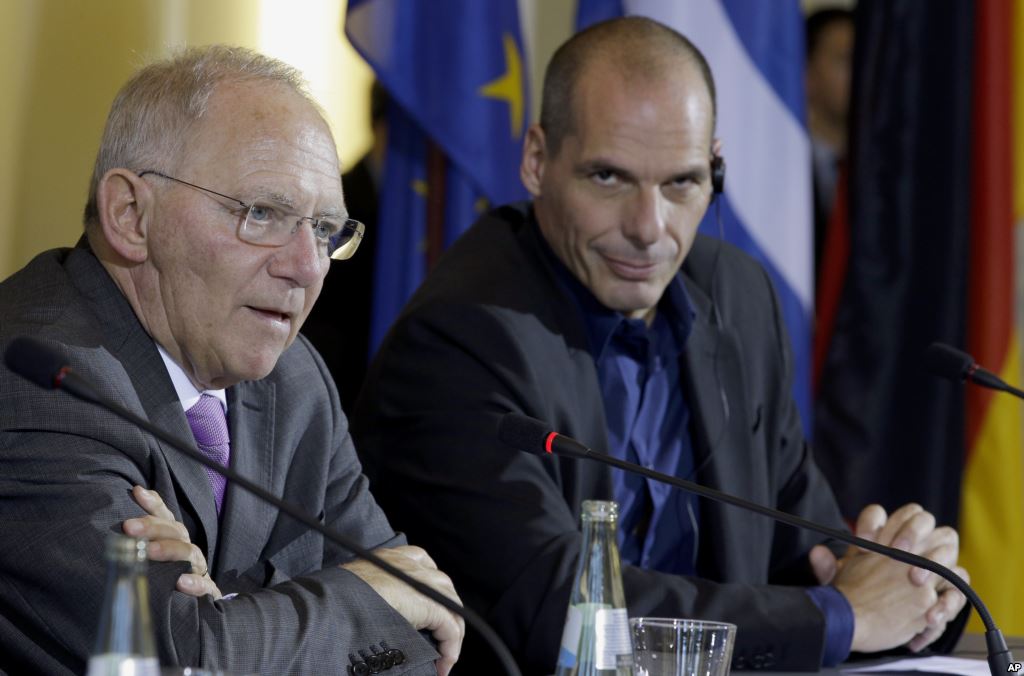According to German finance minister Wolfgang Schauble, Greece would struggle to find creditors outside the EU and IMF.
Wolfgang Schauble said Greece would be welcome to try to find investment from Beijing or Moscow, but may have difficulties.
His warning came after fears of a Greek debt default saw its borrowing costs jump 3.5 percentage points to 27%.
Greek Finance Minister Yanis Varoufakis said his government refuses to consider leaving the EU: “Toying with Grexit… is profoundly anti-European.”
Yanis Varoufakis also promised to “compromise, compromise, compromise without being compromised” to satisfy current creditors.
Wolfgang Schauble and Yanis Varoufakis were speaking at talks in Washington.
On April 15, ratings agency S&P downgraded Greece’s credit rating.
Yields also rose on longer-term Greek borrowing, with the 10-year bond yield – the amount investors demand for lending – rising one percentage point to 13%.
Wolfgang Schauble said that the Greek government needs to find creditors.
“The Europeans have said, OK, we are ready to do it [lend money] until 2020… If you find someone else, whether it’s in Beijing, in Moscow, in Washington DC, or in New York who will lend you money, ok, fine, we would be happy. But it’s difficult to find someone who is lending you in this situation amounts [of] €200 billion.”
He added that Greece must focus on increasing its competitiveness and primary surplus.
Wolfgang Schaeuble was speaking after the Greek government’s borrowing costs surged on April 16.
According to the Financial Times, Greece had made an “informal approach” to the International Monetary Fund to have its bailout repayments delayed, but had been rebuffed.
However, IMF chief Christine Lagarde said at the World Bank spring meeting in Washington: “We have never had an advanced economy asking for payment delays.
“Payment delays are analysed as additional financing granted to that country. Additional financing means additional contribution by the international community – some of which are in much direr situations than the country eventually seeking those delays.
“Payment delays had not been granted by the board of the IMF in the last 30 years and it was eventually granted to a couple of developing countries and that delay was not followed by very productive results.
“It’s clearly not a course of action that would actually fit or be recommendable in the current situation.”
Greece owes the IMF some €1 billion ($1.06 billin) in repayments next month.
Many in the markets think the Greek government will struggle to make those payments if it does not agree an economic reform package with European creditors soon.
Failure to agree a plan with creditors will mean that the country will default, a development that could force the government to put limits on money transfers and even lead Greece to leave the euro.
EU spokesman Margaritis Schinas said on April 16 that the EU was “not satisfied with the level of progress made so far” in debt negotiations.
Wolfgang Schauble had warned that he did not expect an agreement between Athens and its creditors in the next week.
However, Greek PM Alexis Tsipras on April 16 said he was “firmly optimistic” the Greek government could reach a deal with its creditors.
“Despite the cacophony and erratic leaks and statements in recent days from the other side, I remain firmly optimistic that there will be an agreement by the end of the month,” Alexis Tsipras said.
According to Alexis Tsipras, several points of agreement had been found since talks first started, including on areas such as tax collection, corruption and initiatives to distribute the tax burden on those who have the ability to pay.
HEe said the two sides still disagreed on four areas: labor issues, pension reform, an increase in value-added taxes and privatizations, which he referred to as “development of state property”.
In a later tweet, Alexis Tsipras said he was “certain that Europe will choose the path to democracy”.
https://www.youtube.com/watch?v=WnccIG88Tuk
